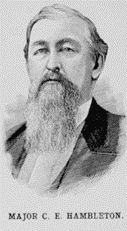Ironton Register 10 Nov. 1887 – Capt. I. B. Murdock Story – For the past year, we have given a “Narrow Escape” in every number of the Register. We have the satisfaction of knowing they have been agreeable to reading. Many words of praise have come to us for our care in keeping up this department. We will continue for some time longer, but the old soldiers must come to our assistance in the way of furnishing the facts.
Sometimes we have hard work in hunting up these experiences, while we know there is plenty to tell. Let them send us the facts briefly of their close calls and exciting experiences or submit to be interviewed and we will rescue from oblivion much that will otherwise be forgotten.
The other day a well-known gentleman (not living here) who gathers historical matter for future use, got a promise from us to furnish all the “Narrow Escapes” when they are concluded, so we don’t know how prominently they may figure in the future histories of the war. We say so much before we proceed to the real story we have in view because it is suggested when we wrote: “No. 52” at the head of this article.
“We have been having the reportorial eye on Capt. I. B. Murdock for some time, so the other night we caught him and before he knew it, he had told me a very interesting escape. Capt. Murdock was in the 2nd Virginia Cavalry and was in all the fights of that fighting regiment. The event that he described to us was not a bloody one, but it was rather exciting.

“It occurred in the Fall of 1862, while the regiment was lying at Camp Piatt on the Kanawha. He said in substance, “One night after dark Capt. Charley Hambleton[1] was detailed with 75 men to go to Loup creek, about 20 miles above on the west side of the river. So, with his command, he crossed the Kanawha at Piatt and moved up the river. What his commission was he did not know, except in a vague, general way he was to scout around for rebels. When within a mile of the mouth of Loup Creek, he sent out an advance guard to station a picket there, while he, Capt. Hambleton with the rest of the command would rest where they were.
[1] For additional information, visit http://www.wvculture.org/history/sesquicentennial/18630626b.html
“When the advance guard arrived at the mouth of the Loup, they found a picket post already established by the Union troops at Gauley, and not deeming it necessary to add more picket, the advance guard fell back to the main body, where along the narrow shore of the river, they all laid down, and being very weary and sleepy from all the night’s ride, were soon lost in a sound slumber.
“The road there is very narrow, and so the squadron was scattered up and down among the bushes at the foot of the hill for about 75 yards. Just about daylight, Capt. I. B. Murdock heard a shot up the river, which no one else seemed to have heard and wouldn’t have noticed it probably, as there was unnecessary shooting up and down the river almost any hour of the day.
But the report of the musket seemed to have put Capt. Murdock is on his guard. For some reason he thought it might be the picket at the mouth of Loup creek, so he concluded not to go to sleep, but await developments.
“It was not long that he had to wait, for up the road he saw some horsemen ride to the top of a little raise and then dodge back again. Immediately he jumped up and ran along the string of men and shook each one vigorously, but they were so sound asleep that he only got four up Jno. S. Duke, Will Hopkins, Dick Davis, and John Carlisle when the rebel cavalry, 300 strong, came swooping down on them. The rebs were in full gallop and did not seem desirous of stopping but went right through those 75-union cavalries like a train of cars.
Our boys, being of course, astonished, and completely surprised, dodged almost every way to escape. Some jumped over the riverbank, some hid behind bushes and trees. These the rebs didn’t bother with. They seemed in a hurry. They appeared about as badly surprised as our boys, and they only took prisoners those who hadn’t had time to get out of the road. There were about fifteen of these and they went to Richmond.

“The reason the rebs were in such a hurry was, they were cut off from their rear and were aiming at some back route further down the river. After the rebels had dashed through and disappeared, our boys got together again and compared notes. Then it appeared that for all the banging and swinging of sabers, nobody was hurt. All the loss was the fifteen prisoners. Our boys crossed the river near Loup creek, and went down on the other side, very much disappointed with their raid, but very happy to have had as many escapes as there were.
Right here, Capt. I. B. Murdock tells another thing that is startling, though not a narrow escape. “A short distance below the scene of the calamity lived a man by the name of Stockton, who owned a little flatboat. The boys asked him for the loan of the boat in which to float down to Camp Piatt. The old man refused them, whereupon the boys cursed him and “hoped he’d drop dead this minute”, and sure enough the old man did drop dead that very minute. That’s the story. Capt. Murdock says it was true history then, but is it really now?”

0 Comments